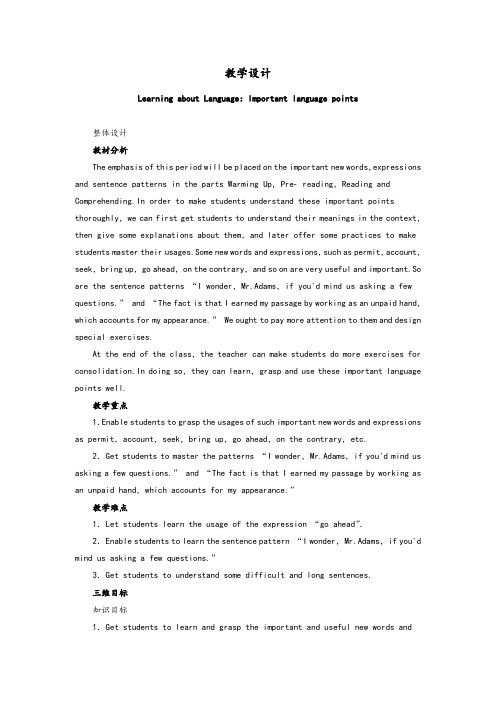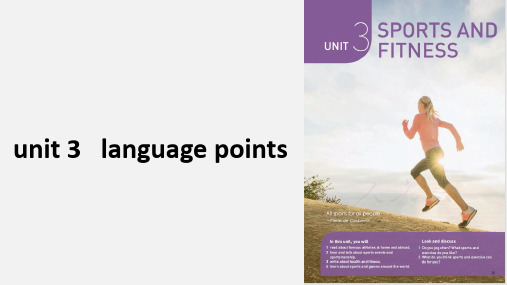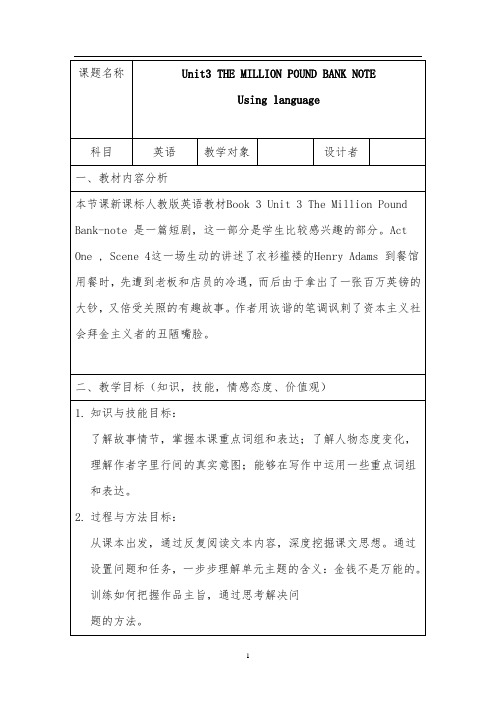湖南省人教版高中英语必修三教案:unit3 Language points (I)
- 格式:doc
- 大小:29.50 KB
- 文档页数:2

教学设计Using Language:Reading,acting and speaking整体设计教材分析In this period,we will mainly deal with the part Reading,acting and speaking in Using Language on Pages 22-23,that is Act Ⅰ,Scene 4 of The Million Pound Bank Note.The purpose of this part of the unit is to continue the play and give students opportunity to act out the scene in class.The teacher can first ask some students to act out Act Ⅰ,Scene 3 of The Million Pound Bank Note and then ask students to read Act Ⅰ,Scene 4 and do some comprehending exercises.While checking their answers with the whole class,deal with language problems students can't work out by ter,let students listen to the tape and role play the text.Have them get into groups of six.Five students will take the roles in the play.They will read their speeches and try to make their language sound authentic.The director will decide how the acting will take place in the scene.He/She will also guide the rest of the group in the use of their voices so that they will sound as much like the characters in the play as they can.Finally,ask students to read Act Ⅰ,Scene 4 again to underline all the expressions used to order food,make up a dialogue at restaurant with their partners and be ready to act it out before the class.At the end of the class,ask students to retell the play of this part in their own words and perform the play of this part or their own dialogue.In order to arouse students' interest,the teacher can hold a competition among them.教学重点1.Develop students' reading and speaking skills.2.Let students read and act the play.3.Have students learn to use the expressions to order food.教学难点1.Enable students to learn to use reading strategies such as skimming,scanning,and so on.2.Get students to act out the play.3.Have students make a dialogue at restaurant.三维目标知识目标1.Get students to learn some useful new words and expressions in this part.2.Get students to read the play.3.Let students learn the expressions of ordering food.能力目标1.Develop students' reading skills and enable them to learn how to use different reading strategies to read different reading materials.2.Enable students to understand and act out the play.3.Have students learn how to use the expressions to order food.情感目标1.Stimulate students' interests of learning English by reading and acting out this play.2.Develop students' sense of group cooperation and teamwork.教学过程Step 1 Revision1.Check the homework exercises.2.Translate the following sentences with noun clauses as the object and the predicative.1)我认为妇女能够在许多科学领域取得很高的成就。

B3U3 Language Points 1Period 1 Listening and Speaking1.diverse(adj.)不同的;多种多样的diversity(n.)差异(性);不同(点);多样性diverse cultures多元文化cultural diversity文化差异The beauty of the world lies in the diversity of its people.世界之美源自人之多样。
The land is home to a great diversity of rare plants and animals.这片土地是多种珍稀动植物的家园。
机会;运气[C.]大笔的钱;巨款 a large amount of money misfortune[U.]厄运;不幸bad luckfortunate(adj.)幸运的;交好运的;吉利的lucky unfortunate(adj.)不幸的unlucky;令人遗憾的regrettable fortunately(adv.)幸运地;吉利地luckily unfortunately (adv.)不幸地;可惜地fortune cookie幸运曲奇He made a fortune in real estate.他在房地产上发了财。
I have been fortunate enough to visit many places of the world as a lecturer.我很幸运,去过世界很多地方做演讲。
3.墨西哥芝士玉米片4.spicy stew辣汤5.ethnic groups族群an ethnic minority少数民族ethnic clothes具有民族特色的服装6.cultural influences on American food对美国食物的文化影响7.a mix of cultures多种文化mixedculture dishes混合文化菜肴(mixed adj.混合的)a mix of A and B A和B的混合mix A and B把A和B混合/融合起来ter on 以后;后来;其后;随后9.be forced into slavery被迫成为奴隶force sb into (doing) sth/force sb to do sth强迫某人做某事10.in addition此外;另外11.die from the diseases死于疾病12.survive these terrible times挺过这段可怕的时期13.When it es to American food, some say no food was ever invented in America.(from listening text)说到美国食物,有人说美国没有发明食物。

教学设计Learning about Language:Important language points整体设计教材分析The emphasis of this period will be placed on the important new words,expressions and sentence patterns in the parts Warming Up,Prereading,Reading and Comprehending.In order to make students understand these important points thoroughly,we can first get students to understand their meanings in the context,then give some explanations about them,and later offer some practices to make students master their usages.Some new words and expressions,such as permit,account,seek,bring up,go ahead,on the contrary,and so on are very useful and important.So are the sentence patterns “I wonder,Mr.Adams,if you'd mind us asking a few questions.” and “The fact is that I earned my passage by working as an unpaid hand,which accounts for my appearance.” We ought to pay more attention to them and design special exercises.At the end of the class,the teacher can make students do more exercises for consolidation.In doing so,they can learn,grasp and use these important language points well.教学重点1.Enable students to grasp the usages of such important new words and expressions as permit,account,seek,bring up,go ahead,on the contrary,etc.2.Get students to master the patterns “I wonder,Mr.Adams,if you'd mind us asking a few questions.” and “The fact is that I earned my passage by working as an unpaid hand,which accounts for my appearance.”教学难点1.Let students learn the usage of the expression “go ahead”.2.Enable students to learn the sentence pattern “I wonder,Mr.Adams,if you'd mind us asking a few questions.”3.Get students to understand some difficult and long sentences.三维目标知识目标1.Get students to learn and grasp the important and useful new words andexpressions in this part:birthplace,novel,adventure,phrase,author,scene,wander,pavement,businessman,permit,ahead,bay,stare,fault,spot,passage,account,embassy,seek,patience,contrary,envelope,bring up,go ahead,by accident,stare at,account for,on the contrary2.Let students learn the following important and useful sentence patterns:1)Young man,would_you step inside a moment,please?(request)2)I_wonder,Mr.Adams,if you'd mind us asking a few questions.(I wonder if...)3)...I found_myself_carried_out to sea by a strong wind.(find+O.+O.C.)4)And it_was the ship that brought you to England.(it is/was...that...)5)The fact is that I_earned_my_passage_by_working_as_an_unpaid_hand...(noun clause as the predicative)6)You mustn't think we don't care about you.(double negative)7)That's why_we've_given_you_the_letter.(noun clause as the predicative)8)Well,why_don't_you explain what_this_is_all_about?(suggestion;noun clause as the object)能力目标1.Get students to use some useful new words and expressions correctly.2.Enable students to make sentences after the useful sentence patterns.情感目标1.Stimulate students' interest in learning English.2.Develop students' spirit of cooperation and teamwork.教学过程Step 1 Revision1.Check the homework exercises.2.Ask some students to talk about Mark Twain and his play.Step 2 Reading and findingGet students to read through Warming Up,Prereading,Reading and Comprehending to underline all the new words and useful expressions or collocations in these parts.Read them aloud and copy them down in the exercise book after class.Step 3 Practice for useful words and expressions1.Turn to Page 20.Go through the exercises in Discovering useful words and expressions with students and make sure they know what to do.2.Give them several minutes to finish the exercises.They first do them individually,and then discuss and check them with their partners.3.Check the answers with the whole class and explain the problems they meet where necessary.Step 4 Studying important language points1.He was brought up in Hannibal,Missouri,along the Mississippi River.他在密西西比河边的密苏里州的汉尼拔长大。


Module3 Unit 1 Festivals aroundthe worldTeaching aims and demands1.topic: 1>Festivals2> how festivals begin3>how to celebrate festivals2.function: 1>RequestEg: Could you please…Could I have …I look forward to doing…2>ThanksEg: It’s a pleasure./Don’t mention it.It’s very kind of you to…I’d love to …Thank you very much./Thanks a lot.You are most welcome.3.vocabulary:4.grammar:Jin can speak English well. (ability)Could you please show me the way to … (reques t)May we see the awards for the team (permission)She might give you … (possibility)The whole family will come for dinner.(promise)Often he would dress up like a rich man.(pass habit)We would be there with our friends.(promise)II.Key pointsPeriod 1-2 Warming up and fast reading1.Greetings2.Warming upStep 1 discussing the following questionsa.How was your holiday/spring festivalb.Did you go travelingc.How much pocket money did you getStep 2 talking1).Name some festivalsSpring Festival Dragon Boat Festival Lantam Festival Mid-Autumn Festival Army Day May Day Teachers’ Day New Year National Day Mother’s Day Children’s Day Father’s DayChristmas Day Halloween carnivalEaster Valentine Day Oben2).Ss work in groups of four and list five Chinese festivals and siscuss when they take place , what they celevrate and one thing that people do at that time.Festivals Time of year/date Celebrate for Things to doMid-Autumn DaySpring FestivalDragon Boat DayTomb sweeping DayLantern Festival3.Pre-reading1) What’s your favourite holiday of the year Why2) What festivals or celebration do you enjoy in your city or town Do you like spending festivals with your family or with friends What part of a festival doyou like best—the music, the things to see, the visits or the food4.Fast reading and find the answers to the following questions.A.What did ancient festivals celebrateB.What are festivals of the dead forC.Why are autumn festivals happy events three things people do at spring festivalPeriod 3-4 Intensive reading1.Read the passage paragraph and find the main ideas of each paragraphParagraph 1: All kinds of celebration in ancient time.Paragraph 2: The purpose to honour the dead and three examplesFestivals Time Things people doObenDay of the DeadHalloweenParagraph 3: The reasons Why we honour peopleFestivals Who does it celebrateDragon Boat FestivalsClumbus DayIndian National FestivalParagraph 4: Autumn festivals are happy eventsParagraph 5: How people celebrate in spring festivals2. Language pointsa.They would starve if food was difficult to find…starve (v.)饿死;挨饿lions of people starved to death during the war.Starve for sth 渴望…Eg.The homeless children starve for love.Starvation (n.) 饿死Eg.Die of starvationStarvation wages 不够维持基本生活的工资b.The most ancient festivals would celebrate the end of the cold weather, plantingin spring and harvest in autumn.Celebrate (vt./vi.) 庆祝, 赞颂, 赞美, 举行(仪式)Eg.We celebrate the new year with a party.Their courage was celebrated in all the newspaper.Celebrated (adj.) = famous 著名的, 驰名的c.…because they thought these festivals would bring a year of plenty.days/years/…of plenty :富裕(尤指事物和钱)的日子, 年月, 生活等。

高中英语人教版必修3Unit3全单元教案设计Unit 3The Million Pound Bank Note单元规划类别课程标准要求掌握的项目话题Forms of literature and art: short story and drama; how to act out a play词汇birthplacen.出生地; 故乡Embassy n. 大使馆; 大使及其官员phrasen.短语; 词组; 惯用语Seek vt. & vi. 寻找; 探索; 寻求adventure n. 奇遇; 冒险patience n. 耐性; 忍耐novel n.小说; 长篇故事adj. 新奇的; 异常的contrary n. 反面; 对立面adj. 相反的;相违的authorn.著者; 作家Envelope n. 信封scenen.(戏剧)一场; 现场; 场面;景色Permit vt. & vi. 许可; 允许; 准许n. 通行证; 许可证; 执照wander vi. 漫游; 漫步; 漂泊steak n. 肉块; 鱼排; 牛排pavement n. 人行道pineapple n. 菠萝businessman n. 商人dessert n. 餐后甜点unbelievable adj. 难以置信的amount n. 数量aheadad v. 在前; 向前; 提前rude adj. 粗鲁的; 无礼的bayn.海湾mannern.礼貌; 举止; 方式stare vi. 凝视; 盯着看scream vi. 尖声叫n. 尖叫声; 喊叫声fault n. 过错; 缺点; 故障genuine adj. 真的; 真诚的bow vi. & n. 鞠躬; 弯腰rag n. 破布; 碎布passage n. 船费; 通道; (一)段indeed adv. 真正地; 确实; 实在account vt. & vi. 认为; 说明; 总计有n. 说明; 理由; 计算;账目spot vt. 发现; 认出n. 斑点; 污点;地点短语bring up抚养; 培养; 教育; 提出in rags衣衫褴褛go ahead 前进; (用于祈使句)可以; 往下说as for关于; 至于by accident偶然; 无意中; 不小心do with对待; 处理; 处置stare at盯着看; 凝视make a bet打赌account for导致; 做出解释be lost迷路; 倾心于某事on the contrary与此相反; 正相反permit sb. to do sth. 准许某人做某事take a chance冒风险; 碰运气in a. . . manner以……的举止(态度)重要句型1. Young man, would you step inside a moment, please? (request)2. I wonder, Mr. Adams, if you’d mind us asking a few questions. (I wonder if. . . )3. . . . I found myself carried out to sea by a strong wind. (find+O. +O. C. )4. And it was the ship that brought you to England. (it is/was. . . that. . . )5. The fact is that I earned my passage by working as an unpaid hand. . . (noun clause as thepredicative)6. You mustn’t think we don’t care about you. (double negative)7. That’s why we’ve given you the letter. (noun clause asthe predicative)8. Well, why don’t you explain what this is all about?(suggestion; noun clause as the object)功能 1. RequestWould you please come in?Could you offer me some kind of work?Would you mind waiting just a few minutes?I wonder, Mr. Adams, if you mind us asking a few questions? May I ask you how much money you have?—Well, to be honest, I have none.—Go right ahead.2. Ordering foodI’d like some ham and eggs and a nice big steak.I’ll have a nice long glass of beer.3. Shopping语法 1. Noun clauses as the objectI can’t say that I have any plans.. . . and he does not know what he should do.。
B3U3 Language Points 2Period 4 Reading for Writing & Assessing Your Progress1.settle(vt.&vi.)定居;结束(争论);解决纠纷settlement(n.)解决;协议;定居点settler(n.)殖民者;移民Historically, Chinese immigrants settled in the area during the railroad construction and gold rush period.历史上,在修筑铁路和淘金热时期,来自中国的移民定居于此。
(定居)It’s time you settled your differences with your father.现在你该解决同你父亲之间的分歧了。
(结束(争论))It has been settled that we leave on the nine o’clock plane.已经定好我们乘坐九点的航班离开。
(确定;决定) the settlement of a dispute争端的解决signs of an Iron Age settlement铁器时代村落遗址white settlers in Africa非洲的白人移民2.construction(n.)建筑;建造;建造物;(句子、短语等的)结构construct(vt.)建造;建筑;建设the construction industry建筑业road construction道路的施工Our new office buildings are still under construction/are still being built.我们的新办公大楼尚在修建中。
a wooden construction木结构建筑物grammatical constructions语法结构construct/build a bridge建桥construct a shelter out of/from/of fallen branches用落下的树枝搭窝棚名词/代词/数词+ + 关系代词()表从属关系The majority of residents in Chinatown are still ethnic Chinese, many of whom do not speak English fluently.如今唐人街的绝大多数居民依旧是华人,他们中很多人英语说得并不流利。
B2U3Language Points 1Period 1 Listening and Speaking1.chat (vi./n.) 聊天;闲聊chattedchattedchattingchat online (adv.) 在线聊天I often chat about old days with my friends on the phone in my spare time.= I often have a chat with my friends about old days on the phone in my spare time.在闲暇时我经常和朋友在里聊聊过去的时光。
(chat with sb about sth = have a chat with sb about sth 与某人闲聊某事)a chat room(互联网上的)聊天室 a group chat 群聊词义关联:talk to/with sb about sth 说话;讲话;谈话speak to sb about sth 谈;谈话;交谈discuss sth with sb 讨论;谈论;商量gossip about sb/sth 传播流言蜚语;说三道四municate with sb/sth 与...交流2.stream(vt.)流播(不用直接在互联网上播放音视频);流出(vi.)流动(n.)小河;溪流stream(vt.) movies and music 流播电影和音乐a stream 一条小河The exhibition has a steady stream of visitors. 参观展览的人络绎不绝。
(a stream of sth/sb (人)流;(车)流)Tears streamed down his face. 泪水顺着他的脸往下流。
Water streamed out of the pipe. 水从水管里流出来。